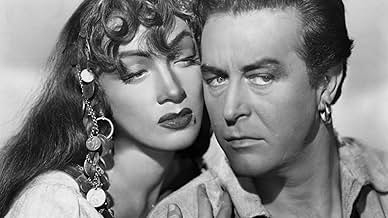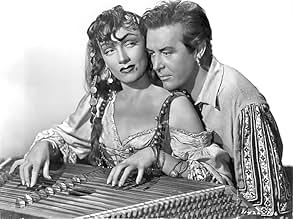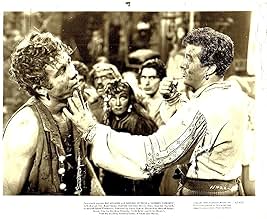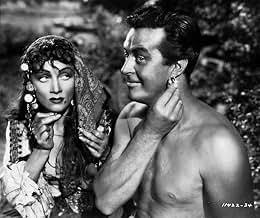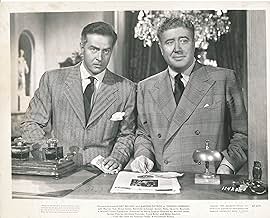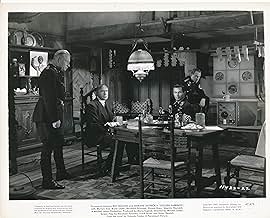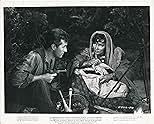IMDb RATING
6.6/10
1.3K
YOUR RATING
On the eve of WW2, a British spy goes to Germany to obtain a secret poison-gas formula from a scientist but things go awry and he is saved by a beautiful nomadic gypsy woman.On the eve of WW2, a British spy goes to Germany to obtain a secret poison-gas formula from a scientist but things go awry and he is saved by a beautiful nomadic gypsy woman.On the eve of WW2, a British spy goes to Germany to obtain a secret poison-gas formula from a scientist but things go awry and he is saved by a beautiful nomadic gypsy woman.
Harry Anderson
- German Farmer
- (uncredited)
Gordon Arnold
- Gypsy Boy
- (uncredited)
Ellen Baer
- Gypsy Girl
- (uncredited)
Martha Bamattre
- Wise Old Woman at the Krosigk's
- (uncredited)
Charles Bates
- Gypsy Boy with Information
- (uncredited)
Carmen Beretta
- Tourist
- (uncredited)
Louise Colombet
- Flower Woman
- (uncredited)
Robert Cory
- Burlington Club Doorman
- (uncredited)
Gwen Davies
- Stewardess
- (uncredited)
Featured reviews
Golden Earrings (1947)
A tough movie to love, but the best parts of it--or the best part, that is, known as Marlene Dietrich--make it easy to like. The actions scenes, the chitchat, even the opening scenes where men talk with bizarre astonishment a man's pierced ears, are often unconvincing. Even the core plot, looking for a key German scientist before it's too late, stumbles over its own clichés. And even worse, a key weakness is the lead male, the low key and unemphatic Ray Milland.
Two years after the end of the war, when this film was made, there must have been a huge appetite for variations on stories about resisting the Nazis. This is a bizarre and highly unlikely one, not because Gypsies weren't involved behind the scenes in the action, but because the idea of a single gypsy woman taking in an Englishman who has to hide, for unexplained reasons, in Germany even though there is no war, is a stretch. (His mission is clear, but why an Englishman has to be undercover isn't historically clear to me.)
But this is what we have, and Dietrich, who is German and began her acting in Germany but by this point was long part of Hollywood, plays a very fictional Gypsy. She is used a little like she was in the famous Josef von Sternberg movies, for her "aura," which she had plenty of.
Most of the movie follows a series of encounters and difficulties with arrogant Nazis and between themselves. Much of the filming is at night, which is dramatic, and there are scenes of Gypsy camps that are part of a long line in Hollywood films. There is also an interesting followup of sorts from Hitchcock's "Notorious" the previous year, in the use of two key German archetypes, Reinhold Schunzel and Ivan Triesault. This is focusing on the details, which is what you have to do. Or just pull back and see a lovely romance unfold.
A tough movie to love, but the best parts of it--or the best part, that is, known as Marlene Dietrich--make it easy to like. The actions scenes, the chitchat, even the opening scenes where men talk with bizarre astonishment a man's pierced ears, are often unconvincing. Even the core plot, looking for a key German scientist before it's too late, stumbles over its own clichés. And even worse, a key weakness is the lead male, the low key and unemphatic Ray Milland.
Two years after the end of the war, when this film was made, there must have been a huge appetite for variations on stories about resisting the Nazis. This is a bizarre and highly unlikely one, not because Gypsies weren't involved behind the scenes in the action, but because the idea of a single gypsy woman taking in an Englishman who has to hide, for unexplained reasons, in Germany even though there is no war, is a stretch. (His mission is clear, but why an Englishman has to be undercover isn't historically clear to me.)
But this is what we have, and Dietrich, who is German and began her acting in Germany but by this point was long part of Hollywood, plays a very fictional Gypsy. She is used a little like she was in the famous Josef von Sternberg movies, for her "aura," which she had plenty of.
Most of the movie follows a series of encounters and difficulties with arrogant Nazis and between themselves. Much of the filming is at night, which is dramatic, and there are scenes of Gypsy camps that are part of a long line in Hollywood films. There is also an interesting followup of sorts from Hitchcock's "Notorious" the previous year, in the use of two key German archetypes, Reinhold Schunzel and Ivan Triesault. This is focusing on the details, which is what you have to do. Or just pull back and see a lovely romance unfold.
I've watched this film perhaps a dozen times, and yet it always stays fresh with me. I think it's one of the best things Dietrich has ever done. This is a Dietrich you've never seen before. Not a worldly femme fatale, but an earthy, highly engaging woman. The interplay between this uncultured gypsy (Dietrich) guided by the spirit world and the stuffy, establishment rationalist(Milland) is both funny and poignant. Dietrich and Milland are simply wonderful in their roles, and Leisen's direction is subtle and clever. If the story lacks plausibility, who cares? This picture belongs to Dietrich and Milland and the wonderful authenticity they bring to their characters.
Marlene Dietrich play a Gypsy who helps British spy (Ray Milland) during World War II. They try to stop the Nazis from using poisonous gases for war use. They get romantically involved with each other while there on the mission. A nice entertaining movie to watch.
Marlene Dietrich plays an European Gypsy woman in Pre-World War II Europe. Ray Milland played the British officer Denistoun who is on a mission. Ray Milland and Marlene Dietrich are excellent, entertaining, and enjoyable in the film. The story is fine and could have used more work but the Milland's British gentleman turned Gypsy in order to escape the Nazis does a fantastic job. It's interesting to see a character like Denistoun to transform into a Gypsy. The ending is worth watching the film. The film doesn't address the Nazi war crimes. European Gypsies were also targeted and persecuted by the Nazis during World War II. Still, this film is entertaining to watch and suspenseful. The cast is first rate in the Hollywood studio system factory where films were made faster even with mediocre scripts. Still, this film is one of my favorites with Marlene Dietrich.
This film is exceptional in that Marlene & Raymond present outstanding performances. The acting in this film is the greatest strength of the production, but the script, direction, and editing deserve applause. There is an extraordinary chemistry that exsists between the two stars. If you like Marlene, and you like Raymond, you'll love this film..... (It's a classic that compares with Casablanca.)
Did you know
- TriviaIn the scene with Lydia and the stew pot, dry ice was used to give the impression of vapors and heat. However, a small fire was lit under it, and when filming resumed, between takes Marlene Dietrich assumed there was no real heat and suffered second-degree burns to her hand. She refused to hold up production and instead kept dipping her hand in the pot that had been refilled with ice water.
- GoofsIn the climax where Lydia is escaping though the wilderness from the Nazis, in some shots she is seen wearing high heels and at other times appears in bare feet.
- ConnectionsFeatured in Hollywood Mavericks (1990)
- SoundtracksGolden Earrings
Music by Victor Young
Lyrics by Jay Livingston and Ray Evans
Sung by Murvyn Vye (uncredited)
- How long is Golden Earrings?Powered by Alexa
Details
Box office
- Budget
- $1,000,000 (estimated)
- Runtime
- 1h 35m(95 min)
- Color
- Aspect ratio
- 1.37 : 1
Contribute to this page
Suggest an edit or add missing content

